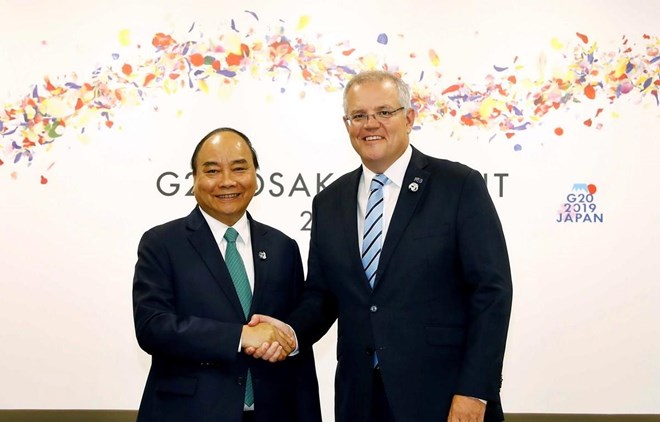
The visit to Vietnam by Australia's Prime Minister Scott Morrison and his spouse from August 22-24 is expected to contribute to promoting the relationship between the two countries effectively and practically.
 |
| Prime Minister Nguyen Xuan Phuc (left) and his Australian counterpart Scott Morrison during G20 Summit in Japan in June 2019. |
The visit to Vietnam by Australia’s Prime Minister Scott Morrison and his spouse from August 22-24 is expected to contribute to promoting the relationship between the two countries effectively and practically.
It takes place amidst the thriving bilateral relations and increasing political trust, with the exchange of high-ranking delegations and meetings.
Vietnam and Australia officially established diplomatic ties on February 26, 1973, and a comprehensive partnership in 2009. The relationship was elevated to a strategic partnership in 2018 during the official visit to Australia by Prime Minister Nguyen Xuan Phuc from March 14-17.
The two countries have effectively implemented the action programme for the 2016-2019 period and are building another one for 2020-2022 to materialise the strategic partnership.
Australia has regarded Vietnam as a key partner in the Association of Southeast Asian Nations (ASEAN), and an effective development partner during the reform process.
The two sides have maintained bilateral cooperation mechanisms, including annual meetings at the ministerial level in such spheres as diplomacy, national defence and economy, and policy dialogues in different realms.
They have fruitfully joined hands in national defence and security through delegation exchanges and agreements on cooperation in crime combat, exit-entry management, the fight against illegal migration, information and experience sharing, English language teaching, and visits of naval ships.
The two sides inked a memorandum of understanding on collaboration in training peace-keeping forces, and bomb and mine clearance in 2016. Australia assisted Vietnam in performing its tasks in the United Nations peace-keeping operations in South Sudan in 2018.
Australia is the only country that has opened a joint transnational crime centre in Vietnam, through which the two countries have exchanged information and cooperated in fighting terrorism, drug crime and human trafficking.
Australia is the longest-standing dialogue partner of ASEAN (since 1974). The two sides set up a strategic partnership in 2014. Australia has applauded Vietnam’s role in the region.
Vietnamese and Australian leaders have repeatedly affirmed their common vision of maintaining peace and stability in the region, including the East Sea. They have also emphasised the settlement of disputes by peaceful measures in line with international law, especially the 1982 United Nations Convention on the Law of the Sea (1982 UNCLOS).
Currently, Vietnam is the fourth largest trade partner of Australia in the ASEAN bloc, while the latter is the 7th largest of the Southeast Asian country. Two-way trade has inched up 8.8 percent each year on average. Their trade revenue grew 19.3 percent to 7.7 trillion USD in 2018, with Vietnam’s exports valued at nearly 4 billion USD. In the first six months of 2019, total trade volume was estimated at 3.84 billion USD, a year-on-year surge of 6.1 percent.
By the end of June, Australian investors had registered over 1.86 billion USD in 458 projects in Vietnam, ranking 20th among the 131 countries and territories having investments in the country. In the meantime, Vietnam had 53 projects worth 247 million USD in Australia.
As one of the largest providers of official development assistance (ODA) for Vietnam (around 66 million USD each year during 2013-2018), Australia has funded various essential infrastructure in the country, including 61 million USD My Thuan bridge and 108.7 million USD Cao Lanh bridge.
During the 2019-2020 fiscal year, Australia continues to fund 78.2 million AUD (53.12 USD) for projects in economic reform, enhancing capacity in gender equality, and livelihood improvement in Vietnam.
Vietnam and Australia have been sharing a history of education and training cooperation. Australia has provided many short-term and long-term fellowships for Vietnamese students. There was a time the number of scholarships granted to Vietnamese nationals reaching 400, and now it is maintained at 100 each year. Currently, there are some 31,000 Vietnamese graduates and postgraduates in Australia.
Besides, there are 18 education exchange programmes carried out by universities and institutes in both nations. Particularly, the Australian Government’s New Colombo Plan, which creates opportunities for Australian undergraduates to undertake semester-based study and internships or mentorships in 40 participating Indo-Pacific locations, has attracted many Australian students and scholars to Vietnam. Around 2,500 Australians have come to Vietnam under the programme during 2015-2019.
Regarding science-technology and innovation, both nations announced the creation of the Vietnam-Australia Innovation Partnership in November 2017, and the Aus4Innovation programme, a 10 million AUD develop assistance programme, is being enacted under the innovation partnership. Its focal objective is to strengthen Vietnam’s innovation system, prepare for and embrace opportunities associated with Industry 4.0, and help shape Vietnam’s innovation agenda in science and technology.
In tourism, the number of Australian arrivals in Vietnam has increased through years. Last year, Vietnam hosted 386, 934 Australian tourists, a year on year surge of 4.1 percent. In the first four month of this year, the number increased 6.6 percent year on year to 14,997.
As Vietnam and Australia began the reciprocal work and holiday visa arrangement from March 2015, more people have chances to visit and work in both nations.
There are around 300,000 Vietnamese people in Australia, creating the 5th largest community in the nation.
Both sides have enjoyed sound collaboration at regional and international forums like the ASEAN, East Asia Summit (EAS), Asia-Pacific Economic Cooperation (APEC), and the United Nations (UN).
During his stay in Vietnam, besides talks and meetings with Vietnam’s top leaders, PM Scott Morrison will meet with excellent businesses of both countries, and have an exchange with the UN’s peacekeeping force at the Vietnam Military Medical University.
His visit will bear a hallmark in the robust Vietnam-Australia relations.
(Source: VNA)





